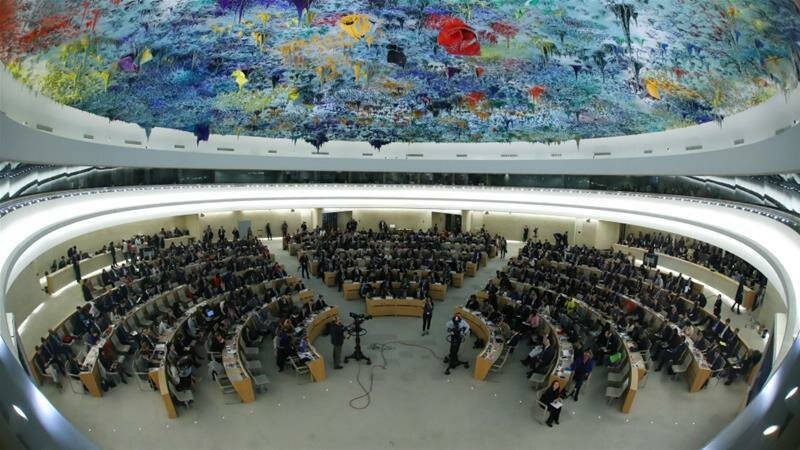Saudi Arabia criticized over human rights by 36 countries

Thirty-six countries have signed an open letter criticizing Saudi Arabia's human rights record.
The letter, read Thursday at a meeting of the United Nations Human Rights Council, is the first collective rebuke of the kingdom.
It urges Saudi Arabia to release human rights activists jailed for "exercising their fundamental freedoms" and to "disclose all information available" about the killing of journalist Jamal Khashoggi.
"I call upon Saudi Arabia to ensure that all members of the public including human rights defenders and journalists can freely and fully exercise their right to freedom of expression and association including online and without fear of reprisals," Iceland's ambassador Harald Aspelund said during the session in Geneva.
He called for the release of women rights defenders Loujain al-Hathloul, Hatoon al-Fassi, and Samar Badawi and others jailed after campaigning for human rights in the country.
Last week, Saudi Arabia announced that prosecutors were preparing a case against a number of the detainees for "undermining the security and sovereignty of the Kingdom."
Reading from the letter, Ambassador Aspelund said: "investigations into the killing [of Jamal Khashoggi] must be independent and transparent."
The collective rebuke was signed by all countries in the European Union, as well as Iceland, Australia, Canada, Norway, New Zealand, Liechtenstein, Monaco, and Montenegro.
CNN has reached out to the kingdom for comment.
The CIA has concluded that Saudi Crown Prince Mohammed bin Salman personally ordered Khashoggi's killing. Riyadh has maintained that neither bin Salman nor his father, King Salman, knew of the operation to target the journalist. Officials have also denied that jailed female activists have been tortured.
The statement to the UN council came as Saudi Arabia appears to be facing renewed international pressure in recent days.
Amnesty International said in a statement Wednesday that the moment had come for states to take a stand against the kingdom's violation of rights.
Heba Morayef, Amnesty International's Regional Director for the Middle East and North Africa, said: "This initiative at the UN Human Rights Council offers a rare opportunity for states to take a strong public stand against the catalog of human rights violations by the government of Saudi Arabia.
"States who stay silent risk abdicating responsibility at a crucial moment and sending a dangerous message that Saudi Arabia can continue to commit egregious abuses without being held to account," Morayef said.
Earlier in the day, UN High Commissioner for Human Rights Michelle Bachelet had slammed Saudi Arabia over the "apparently arbitrary arrest and detention" of the women rights defenders.
Bachelet said: "The persecution of peaceful activists would clearly contradict the spirit of the country's proclaimed new reforms. We urge that these women be released."
And separately, U.S. lawmakers in Washington condemned the kingdom's "gangster"-like abuses during retired Gen. John Abizaid's nomination hearing to be the Trump administration's first ambassador to Saudi Arabia.
Lawmakers pressed Abizaid on the kingdom's domestic repression, the alleged detention and torture of activists and royal family members as well as the recent alleged torture of a U.S. citizen.
Republican Sen. Marco Rubio of Florida said the Crown Prince has "gone full gangster" before adding that "it's difficult to work with a guy like that."
While the actions by the UN appear to have ramped up, Gregory Gause, a Saudi expert at Texas A&M University, told CNN that on the diplomatic front, and in the U.S. Congress, the momentum against Saudi Arabia has not stopped since the Khashoggi killing.
Gause said the condemnation at the UN meeting will be concerning to the kingdom given that Saudi Arabia "unlike some other human rights violators, has always had good relations with the U.S. and Western Europe."
"These recent high-profile acts from the Saudi government make it harder for Western governments to sustain the relationship."
Aware of the kingdom's negative image, Gause said efforts were already underway to alter the country's perception into something more positive with moves like the appointment of Princess Reema bint Bandar Al Saud as ambassador to Washington.
Gause added that, ultimately, the Crown Prince is not going anywhere.
"Riyadh is not going to accept that. The Crown Prince is running the show," Gause explained. "The issue here is just what an acceptable solution would be to the Western capitals."
(Source: CNN)
